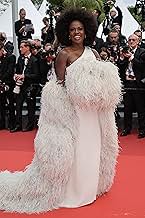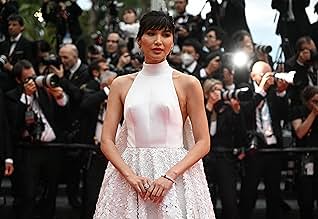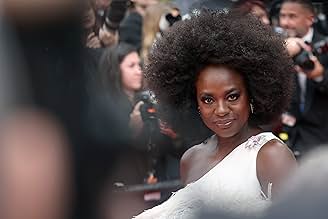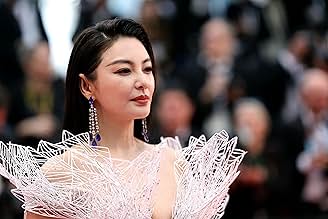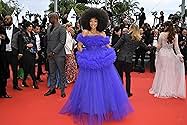A mother demands answers from her son's teacher when her son begins acting strangely.A mother demands answers from her son's teacher when her son begins acting strangely.A mother demands answers from her son's teacher when her son begins acting strangely.
- Awards
- 10 wins & 48 nominations total
- Director
- Writer
- All cast & crew
- Production, box office & more at IMDbPro
Featured reviews
Ryuichi Sakamoto's music, the precise editing, the great use of anamorphic lenses, the surprisingly dynamic soundscape, the great use of the Ronin 4D compact camera system, Hirokazu's brilliant directing and surprisingly dynamic staging. All of this existed to serve the impeccable performances and the brilliant story.
Yes, it's very much a contemporary piece, made with contemporary gear, set in the present. Still, the story felt timeless. I think that's why comparisons to the classic Rashomon are often made about this film, though I find them incredibly stretched. We are never lied to like we would've been watching Rashomon in this film, we experience the story exactly as the characters experience them.
In a time where meta films like Babylon and Asteroid City are starting to re-examining their own value, and even big blockbusters like Oppenheimer and Dead Reckoning needed to remind a post-COVID audience of their "return to practicality" techniques to bring them to the cinemas, this is the one that truly reminded me of why I go to the movies in the first place.
Lightning in a bottle.
Yes, it's very much a contemporary piece, made with contemporary gear, set in the present. Still, the story felt timeless. I think that's why comparisons to the classic Rashomon are often made about this film, though I find them incredibly stretched. We are never lied to like we would've been watching Rashomon in this film, we experience the story exactly as the characters experience them.
In a time where meta films like Babylon and Asteroid City are starting to re-examining their own value, and even big blockbusters like Oppenheimer and Dead Reckoning needed to remind a post-COVID audience of their "return to practicality" techniques to bring them to the cinemas, this is the one that truly reminded me of why I go to the movies in the first place.
Lightning in a bottle.
It's been a while since I've seen a movie with such a smart and yet unpretentious and delicately constructed script, all the while managing not to "flex" it's wiseness on the viewer like most western script-focused works do.
The movie takes three perspectives of charatcers with wildly differing outlooks on a situation, as well as problems in their lives, to guide you through a series of events that starts as looking like a typical case of teacher psychological and physical abuse, but, through the juxtaposing of these three different perspectives, manages to paint a picture with details and nuance hardly ever found on movies, and reveal that the issue was about something else entirely. With characters with complex emotions and issues, as well as not always clear or comprehensive actions, like real life human beings, it is a captivating watch.
With no spoilers, as I feel the movie works best going in without knowing a single thing about it, I can only describe or hint that there are no monsters at all in the movie, the 'Monster' in the title here would have been better translated as 'Beast', or something non-human, sub-human specially, and it is a commentary on how we are all made to feel sub-human sometimes for the way we feel and how we act, a commentary on the shortcomings of humans as individuals, as well as the fact that this 'un-humaness' sometimes projected into us by our peers is in fact what makes us Human. Everyone in this movie (save a few non-protagonist characters) is capable of great love as well as great harm. As a troubled kid, deeply misinterpreted during my shcool years, who suffered abuse and neglect, but also caused great harm on others, I couldn't help but cry copiously during some scenes in this movie, and I can count on my fingers the amount of times I've cried during a movie. Acting is on point as well, with a special mention to the kid's duo who manage to protray an immensily complex and believable relationship. On a techical level the film is subdued, although it shines here and there (one scene specially): the photogrphy is nothing mind blowing, the same can be said for the soundtrack, but I feel these elements, that can often break the suspense of disbelief, ot take too much attention to itself when being over the top, was left purposefully barebones for the audience to focus on the characters and the stories being told. Excellent film, so far Koreeda's best (that I've watched) and I hope it wins as many Best Foreign Picture awards as possible.
The movie takes three perspectives of charatcers with wildly differing outlooks on a situation, as well as problems in their lives, to guide you through a series of events that starts as looking like a typical case of teacher psychological and physical abuse, but, through the juxtaposing of these three different perspectives, manages to paint a picture with details and nuance hardly ever found on movies, and reveal that the issue was about something else entirely. With characters with complex emotions and issues, as well as not always clear or comprehensive actions, like real life human beings, it is a captivating watch.
With no spoilers, as I feel the movie works best going in without knowing a single thing about it, I can only describe or hint that there are no monsters at all in the movie, the 'Monster' in the title here would have been better translated as 'Beast', or something non-human, sub-human specially, and it is a commentary on how we are all made to feel sub-human sometimes for the way we feel and how we act, a commentary on the shortcomings of humans as individuals, as well as the fact that this 'un-humaness' sometimes projected into us by our peers is in fact what makes us Human. Everyone in this movie (save a few non-protagonist characters) is capable of great love as well as great harm. As a troubled kid, deeply misinterpreted during my shcool years, who suffered abuse and neglect, but also caused great harm on others, I couldn't help but cry copiously during some scenes in this movie, and I can count on my fingers the amount of times I've cried during a movie. Acting is on point as well, with a special mention to the kid's duo who manage to protray an immensily complex and believable relationship. On a techical level the film is subdued, although it shines here and there (one scene specially): the photogrphy is nothing mind blowing, the same can be said for the soundtrack, but I feel these elements, that can often break the suspense of disbelief, ot take too much attention to itself when being over the top, was left purposefully barebones for the audience to focus on the characters and the stories being told. Excellent film, so far Koreeda's best (that I've watched) and I hope it wins as many Best Foreign Picture awards as possible.
A very well constructed film exploring the complexity of how simple words and actions affect people in unexpected ways. Highly relatable in showing how, armed with only a superficial understanding of a person or situation, context can be manufactured to fit a particular narrative. But not only individuals, but institutions as well are put in the crosshairs. The bureaucratic value placed on appearance and propriety (perhaps more particularly in Japanese society but nevertheless universal) is also critiqued.
But the most telling point, and for me the one most central to the story, was what could have been dismissed as a throw-away line. But at its heart, the perfect example of how simple words create a life of their own. It's when the teacher, Mr. Hori, casually, and quite un-seriously, remarks in the PE class about what it is to be a man. At its core, that's what the film is about, understanding who you are as a human, and accepting it on your own terms. Confusion, misinterpretation, familial and societal expectations of how someone must be, or act, or love, can turn them into the other, the strange, the monster. And the film is overflowing with empathy for all those who become afflicted in one way or another.
If the film has one drawback, it's that the editing in the later stages of the film gets a bit loose. The time-jump and multiple perspective structure of the film works magnificently well for most of the film, but nearing the end, it does tend to drag a bit. But overall, a wonderfully engaging and skillfully produced film.
But the most telling point, and for me the one most central to the story, was what could have been dismissed as a throw-away line. But at its heart, the perfect example of how simple words create a life of their own. It's when the teacher, Mr. Hori, casually, and quite un-seriously, remarks in the PE class about what it is to be a man. At its core, that's what the film is about, understanding who you are as a human, and accepting it on your own terms. Confusion, misinterpretation, familial and societal expectations of how someone must be, or act, or love, can turn them into the other, the strange, the monster. And the film is overflowing with empathy for all those who become afflicted in one way or another.
If the film has one drawback, it's that the editing in the later stages of the film gets a bit loose. The time-jump and multiple perspective structure of the film works magnificently well for most of the film, but nearing the end, it does tend to drag a bit. But overall, a wonderfully engaging and skillfully produced film.
The story isnt that complex but the journey the film maker takes us on is complex, exaggerating along the way the opacity of the conundrums facing the subjects. Life is difficult, until you see the end result, so navigating life can be extremely taxing and frustrating. This movie is called Monster, meaning that assumptions are often the monsters that they lead us down painful paths, often unnecessarily.
This is a deeply compassionate film. It requires an investment from the viewer but pays off handsomely in the end. This is a filmmaker who is improving with every release. Soon he will be in the same strata as Park Chan Wook.
This is a deeply compassionate film. It requires an investment from the viewer but pays off handsomely in the end. This is a filmmaker who is improving with every release. Soon he will be in the same strata as Park Chan Wook.
I'm a fan of Kore-eda's feature films, namely the more Stream-of-consciousness movies from the earlier part of his career - MABOROSI, THE AFTERLIFE, & DISTANCE are among my favorites of his work from the mid-1990s to the early 2000s. In his subsequent films that seem to focus even more on social commentary via a neo-realist approach to story telling, Kore-eda managed to show just how good he is in directing children with little to no experience in acting to shine in NOBODY KNOWS and THE MIRACLE. In between, he experimented with comedy (HANA), a twist of fantasy collaborating with non-Japanese actors and cinematographer in AIR DOLL, and then back to more social-commentary and plot driven - some were Melodrama-esque, kitchen-sink films, and others he dabbled in crime whodunnit stories... all of which except for MABOROSI he took charge with writing the screenplays highlighting the fact these were personal stories and messages he wanted to share through the art of Kore-eda cinema.
While the 2 most recent Kore-eda films were overseas collaborations, they seem to show Kore-eda does his best work in Japan, and MONSTER (KAIBUTSU) shows how Kore-eda can shine even when the story isn't penned by himself.
To fans of Kore-eda's earlier films I'd mentioned above, MONSTER is much more story and character driven, and the story is much more accessible than his films prior to NOBODY KNOWS. Many film critics have highlighted the RASHOMON-like approach to story telling. While the technique is similar, the point intended is very different from Kurosawa's use of POV story reveal - Kore-eda uses POV to reveal the truths in the story, while Kurosawa uses perspective story telling to show the audience there is no objectivity with human memories - people will choose to remember and recall memories that isn't necessarily true, but serves to protect their self-interests.
To me, MONSTER has all the heart, humanity, and social commentary that I love from Kore-eda films, but it almost is too accessible for it to be a Kore-eda story - fair to say it isn't his story as he didn't write the screenplay this time. It actually feels like a Shunji Iwai film to me, and some scenes in MONSTER reminds me of Iwai's ALL ABOUT LILY CHOU CHOU. The ending of MONSTER, to me, has a tone & manner that reminds me of Studio Ghibli films like ONLY YESTERDAY (not by Hayao Miyazaki but the late director Isao Takahata) - the messages, the social commentary, the music cues and clues to the ending (if you consider lens flare and changes to the set props) are all so clearly planted - in fact, I wouldn't have expected Kore-eda to feel the audience need to get the ending, but he seems to want to make sure we do through Easter-egg-type devices in the movie (Pay attention to scenes showing the train tracks if you don't know what I mean)...
Is Kore-eda back in good form after dabbling with his French and Korean collaborations? The audience is the best to judge, but being a Kore-eda fan, I enjoyed MONSTER even though I was hoping for a film with less of the planted clues/cues, and this is from me who don't mind the Ozu-esque long takes(MABOROSI, THE AFTERLIFE), 10+ minutes of seeing feet on grass being lost in the woods (DISTANCE), or dialog so subtle you could easily miss that one line about vengeful hate that will make your heart sink (STILL WALKING)...
Last but not least, MONSTER was awarded the Queer Palm prize at Cannes - while I have no intentions to provide a spoiler here, but by virtue of winning the Queer Palm, MONSTER is now considered to be endorsed by the LGBTQ community - the fact that one reaction from a character towards another in one scene can turn what is otherwise no more than fondness/comraderie for children into a sign of Romantic Love, that which for boys at that age when companionship doesn't need to be associated with the idea of romance, let alone sexual orientation and preferences to validate and distinguish (I'm thinking more Mark Lester & Jack Wild in MELODY (1971), the characters of Jean and Julien in Louis Malle's AU REVOIR, LES ENFANTS (1987) and not the characters of Leo & Remi in a much more B/Romance-Losses-Causes focused narrative in CLOSE(2022)) - that one reaction so deliberately planted into the one scene is to me very un-Kore-eda. In my opinion this was done to ensure the audience get the intention without any doubt - wasn't necessary and seemed too deliberate for a Kore-eda film... but then and again, he didn't write the screenplay, and this must have been written deliberately as a key plot-point so to broaden the audience appeal.
While the 2 most recent Kore-eda films were overseas collaborations, they seem to show Kore-eda does his best work in Japan, and MONSTER (KAIBUTSU) shows how Kore-eda can shine even when the story isn't penned by himself.
To fans of Kore-eda's earlier films I'd mentioned above, MONSTER is much more story and character driven, and the story is much more accessible than his films prior to NOBODY KNOWS. Many film critics have highlighted the RASHOMON-like approach to story telling. While the technique is similar, the point intended is very different from Kurosawa's use of POV story reveal - Kore-eda uses POV to reveal the truths in the story, while Kurosawa uses perspective story telling to show the audience there is no objectivity with human memories - people will choose to remember and recall memories that isn't necessarily true, but serves to protect their self-interests.
To me, MONSTER has all the heart, humanity, and social commentary that I love from Kore-eda films, but it almost is too accessible for it to be a Kore-eda story - fair to say it isn't his story as he didn't write the screenplay this time. It actually feels like a Shunji Iwai film to me, and some scenes in MONSTER reminds me of Iwai's ALL ABOUT LILY CHOU CHOU. The ending of MONSTER, to me, has a tone & manner that reminds me of Studio Ghibli films like ONLY YESTERDAY (not by Hayao Miyazaki but the late director Isao Takahata) - the messages, the social commentary, the music cues and clues to the ending (if you consider lens flare and changes to the set props) are all so clearly planted - in fact, I wouldn't have expected Kore-eda to feel the audience need to get the ending, but he seems to want to make sure we do through Easter-egg-type devices in the movie (Pay attention to scenes showing the train tracks if you don't know what I mean)...
Is Kore-eda back in good form after dabbling with his French and Korean collaborations? The audience is the best to judge, but being a Kore-eda fan, I enjoyed MONSTER even though I was hoping for a film with less of the planted clues/cues, and this is from me who don't mind the Ozu-esque long takes(MABOROSI, THE AFTERLIFE), 10+ minutes of seeing feet on grass being lost in the woods (DISTANCE), or dialog so subtle you could easily miss that one line about vengeful hate that will make your heart sink (STILL WALKING)...
Last but not least, MONSTER was awarded the Queer Palm prize at Cannes - while I have no intentions to provide a spoiler here, but by virtue of winning the Queer Palm, MONSTER is now considered to be endorsed by the LGBTQ community - the fact that one reaction from a character towards another in one scene can turn what is otherwise no more than fondness/comraderie for children into a sign of Romantic Love, that which for boys at that age when companionship doesn't need to be associated with the idea of romance, let alone sexual orientation and preferences to validate and distinguish (I'm thinking more Mark Lester & Jack Wild in MELODY (1971), the characters of Jean and Julien in Louis Malle's AU REVOIR, LES ENFANTS (1987) and not the characters of Leo & Remi in a much more B/Romance-Losses-Causes focused narrative in CLOSE(2022)) - that one reaction so deliberately planted into the one scene is to me very un-Kore-eda. In my opinion this was done to ensure the audience get the intention without any doubt - wasn't necessary and seemed too deliberate for a Kore-eda film... but then and again, he didn't write the screenplay, and this must have been written deliberately as a key plot-point so to broaden the audience appeal.
Did you know
- TriviaKoreeda said that all the characters in the film, to some degree, are imprisoned by invisible walls. "The mother is restricted by social norms, and the teacher is restricted by his manhood, as well as the school system. And the children are living in this world that the adults have created and they are affected by it, in terms of the violence that is perpetrated upon them. Yet they are able to escape it. It's as if the adults have been left behind, and the children have gone ahead and come to their own self-realization. I wanted it to be a positive realization."
- SoundtracksAqua
Written by Ryuichi Sakamoto
Performed by Ryuichi Sakamoto
- How long is Monster?Powered by Alexa
Details
- Release date
- Country of origin
- Official sites
- Languages
- Also known as
- Monster
- Filming locations
- Production companies
- See more company credits at IMDbPro
Box office
- Gross US & Canada
- $434,585
- Opening weekend US & Canada
- $25,603
- Nov 26, 2023
- Gross worldwide
- $20,453,866
- Runtime2 hours 7 minutes
- Color
- Sound mix
- Aspect ratio
- 2.39 : 1
Contribute to this page
Suggest an edit or add missing content




